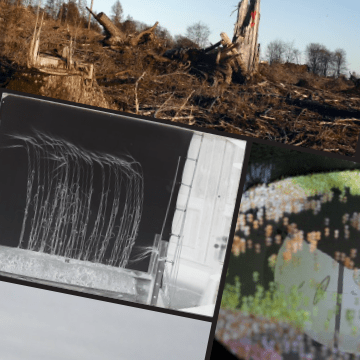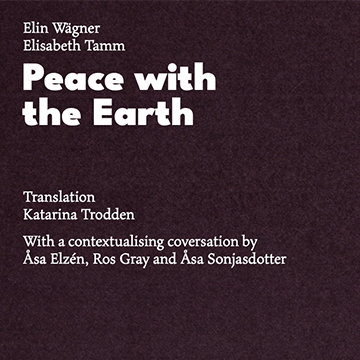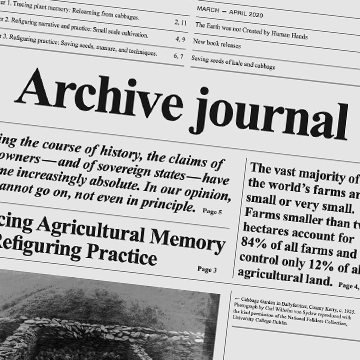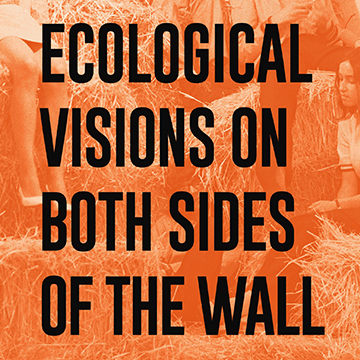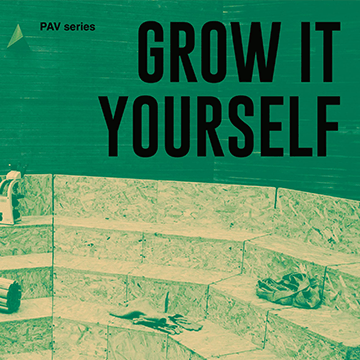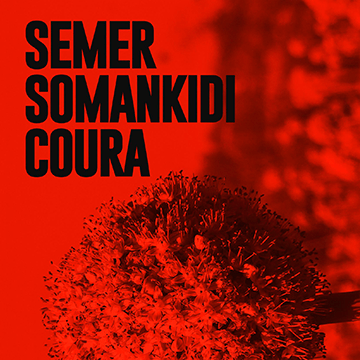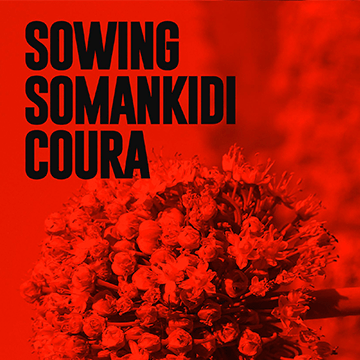Contested Landscapes is dedicated to different rural regions—their landscapes, their producers, and their work. The paths of the family of the artist Sandra Schäfer and those of the famous German photographer August Sander cross in the Westerwald, a rural area in Germany shaped by farming and mining.
Tag: Agriculture
Peace with the Earth
The pamphlet Peace with the Earth was published by the Swedish suffragettes and peace activists Elisabeth Tamm and Elin Wägner in 1940, after the outbreak of the Second World War. Elisabeth Tamm served as one of the first women in parliament and was an organic farmer. Elin Wägner worked as a writer and activist on matters of women’s rights, peace, and ecology, and was a member of the Swedish Academy. The authors’ observations and proposals connect questions of agriculture to those of custody of land and habitats, where the ‘arrogant desire’ to own land must be overcome.
Archive Journal n°9
This issue was initiated by visual artist, researcher and amateur plant breeder Åsa Sonjasdotter to accompany her exhibition and seed propogation project at Project Arts Centre (PAC), Dublin. In collaboration with practitioners of cultivation, the project 'Peace with the Earth – Tracing Agricultural Memory, Refiguring Practice' revisits histories of agriculture. It investigates soil, habitat and dwelling histories, in order to challenge and transform long-established cultural narratives of cultivation and ecological thinking.
Earthrise
There is no question that ecological ideas acquired a central role in contemporary episteme. In contrast, the heuristic function that these ideas can assume in the current polarisation is questionable: that which, over the last decade, has identified the environmental crisis with the (categorical and totalitarian) concept of the Anthropocene. Ecological discourse positioned itself inside historically situated trajectories that contributed to the transformation of aesthetical paradigms and political practices. In the scenario that 1968 opened up, the transversal nature of subjectivity allowed it to cover different fields, beginning with the tension between the logic of a unitary discourse and the creation of a multiplicity of possible worlds, between the molar and the molecular, the micro and the macro.
Grow it Yourself
There is no question that ecological ideas have by now acquired a central role in contemporary episteme. In contrast, the heuristic function that these ideas can assume in the current polarisation is questionable: that which, over the last decade, has identified the environmental crisis with the (categorical and totalitarian) concept of the Anthropocene. […] Nonetheless, if it is true that the concept of the Anthropocene has its origins in this “change in state” of human activities, the impression remains of being witness to a new form of universalizing anxiety (impatience) that is ready to re-establish and recapture the ecological discourse within a to- talitarian and centralizing narrative, in a sort of modernist, meta-narrative to whose liquidation the environmentalism of the 1960s and 1970s (with its movement-based and destituent nature) had contributed.
Semer Somankidi Coura
Sowing Somankidi Coura. A Generative Archive is a long-term research endeavor initiated by Raphaël Grisey in collaboration with Bouba Touré. The project revolves around the permacultures and archives of Somankidi Coura, a self-organized cooperative along the Senegal river. The cooperative was founded in 1977 by a group of former African migrant workers and activists in France after the Sahel drought of 1973.
Sowing Somankidi Coura
Sowing Somankidi Coura. A Generative Archive is a long-term research endeavor initiated by Raphaël Grisey in collaboration with Bouba Touré. The project revolves around the permacultures and archives of Somankidi Coura, a self-organized cooperative along the Senegal river. The cooperative was founded in 1977 by a group of former African migrant workers and activists in France after the Sahel drought of 1973.
